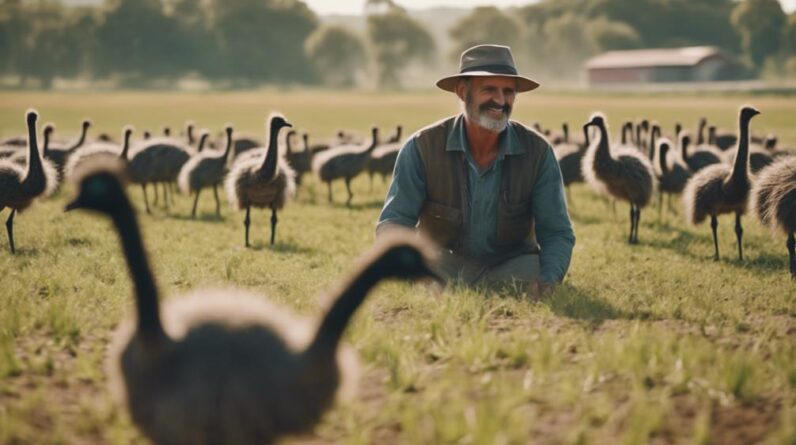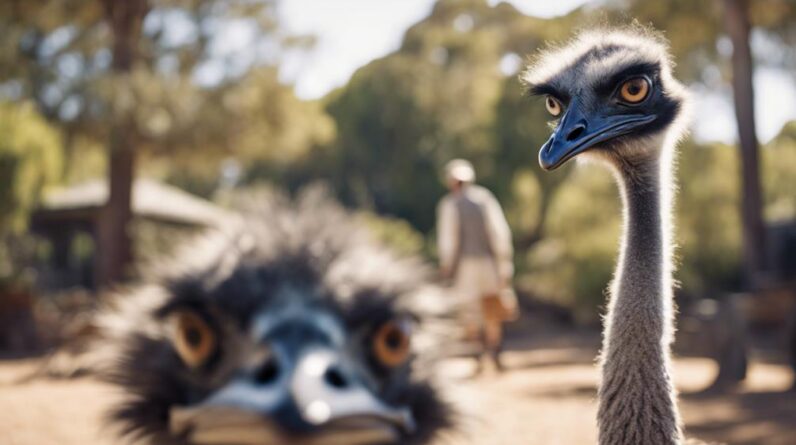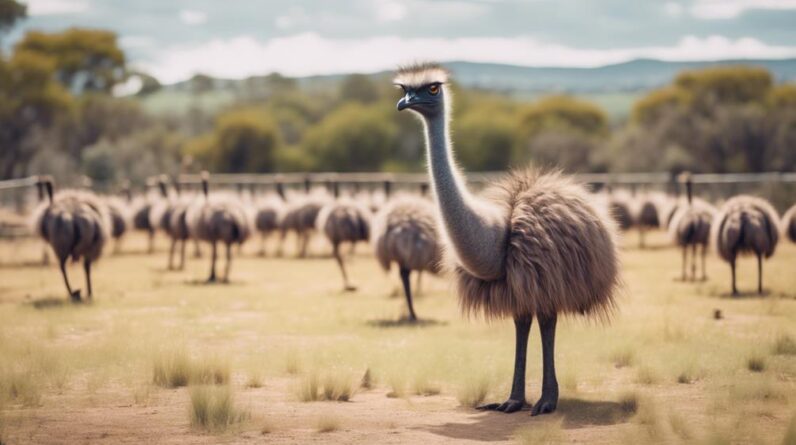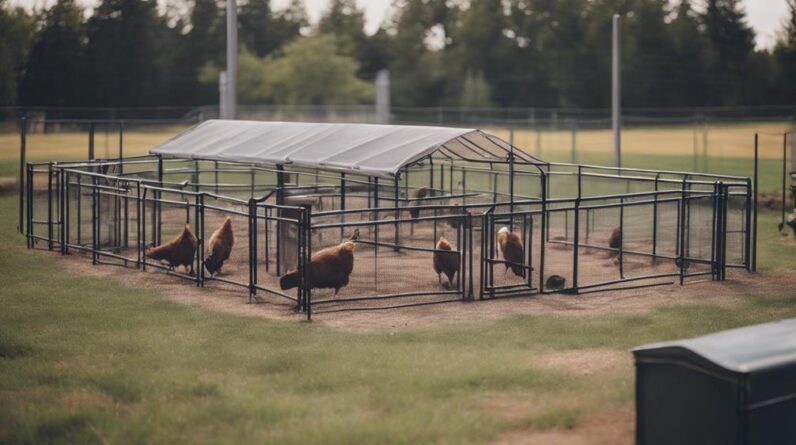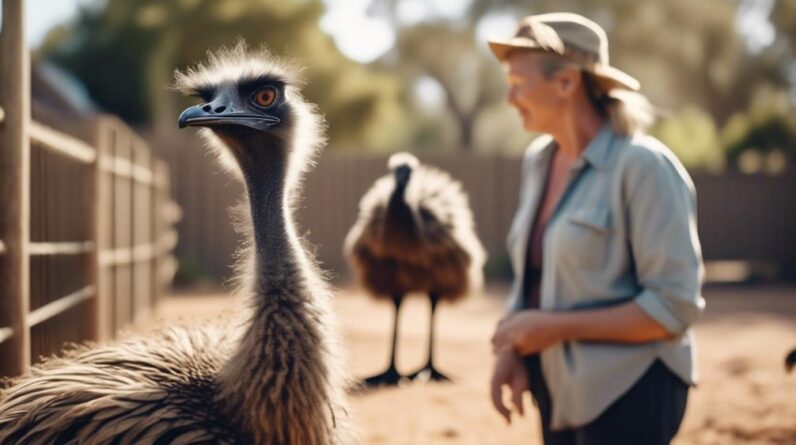
Picture this: you're strolling through a bustling pet store, eyes darting from one adorable creature to another, when suddenly you spot it – a majestic emu bird. With its tall stature and curious gaze, it's hard not to be captivated by this unique feathered companion.
But before you rush to bring one home, there are a few things you need to know. Emu birds as pets can be both rewarding and challenging, requiring careful consideration and preparation.
From their specialized diet to their socialization needs, this article will delve into the world of emu birds, providing you with the essential knowledge to make an informed decision.
So, before you take the plunge, let's explore what it truly means to have an emu bird as a pet.
Key Takeaways
- Emus require a pair for successful breeding and need a large and secure enclosure.
- Emus mainly eat plants and insects, including fresh fruits and vegetables like lettuce, kale, carrots, and apples.
- Emus build their nests on the ground in secluded areas with tall grass or shrubs, and they require ample space to roam and establish their territory.
- Emus communicate through vocalizations and non-vocal communication, and understanding their natural behaviors and providing a stimulating environment is essential for their well-being.
Emu Bird Basics
What are the basic facts you need to know about keeping Emu birds as pets?
When it comes to Emu bird breeding, there are a few important things to consider. First, it's crucial to have a pair of Emus for successful breeding. Emus are social creatures and thrive when they have a companion. Additionally, you need to ensure that you have enough space for the birds to roam and exercise freely. Emus require a large and secure enclosure to prevent them from escaping.
When it comes to Emu bird egg incubation, it's crucial to have the right equipment and knowledge. Emu eggs are quite large, weighing around 1.5 pounds and requiring specific conditions to hatch successfully. The incubation period for Emu eggs is approximately 50-55 days, during which the temperature and humidity levels need to be carefully regulated. It's recommended to use a specialized incubator designed for large eggs, ensuring optimal conditions for their development.
Remember that breeding and incubating Emu eggs require a significant commitment of time, resources, and knowledge. It's essential to educate yourself thoroughly and seek guidance from experienced breeders to ensure the well-being and success of your Emu birds' breeding and egg incubation endeavors.
Emu Bird Diet
Emus have a specialized diet that consists mainly of plants and insects. As an emu owner, it's crucial to understand their food choices and nutritional requirements to ensure their optimal health and well-being.
In the wild, emus graze on a variety of plants such as grasses, leaves, fruits, and seeds. As pets, emus can be fed a combination of fresh fruits and vegetables, including lettuce, kale, carrots, and apples. These provide essential vitamins and minerals necessary for their growth and development. It's important to wash and chop the fruits and vegetables into small, manageable pieces before feeding them to your emu.
In addition to plants, emus also consume insects as a source of protein. They particularly enjoy feasting on beetles, crickets, and grasshoppers. These insects offer the necessary nutrients needed for muscle development and overall health. You can provide live insects or commercially available dried insects as a supplement to their diet.
To meet their nutritional requirements, emus also require access to fresh water at all times. Make sure to change their water regularly to maintain its cleanliness.
Emu Bird Habitat
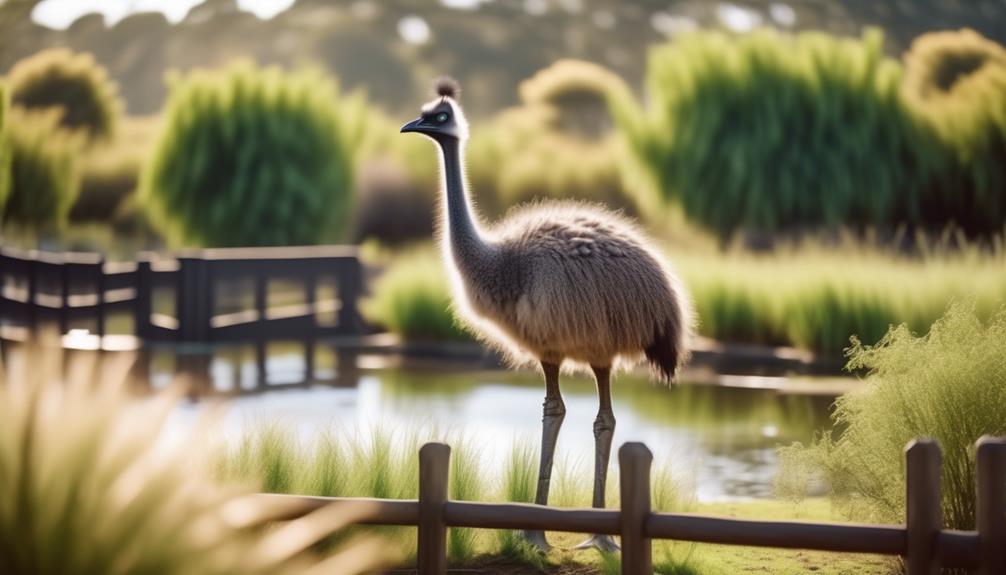
When it comes to creating an ideal environment for your emu, it's essential to provide them with a suitable habitat that meets their specific needs.
Emus have specific nesting habits and territorial behavior that should be taken into consideration.
Emu birds are known to build their nests on the ground. They prefer to nest in secluded areas with tall grass or shrubs that provide them with cover and protection. It's important to create a nest area that mimics their natural habitat. You can achieve this by providing a soft bed of straw or hay for them to lay their eggs on. Make sure the nest is well-hidden and protected from predators.
Emu birds are territorial creatures. They require ample space to roam and establish their territory. It's recommended to provide at least one acre of land per emu. Fencing is necessary to prevent them from wandering off and to protect them from potential dangers. The fence should be at least six feet high to ensure they can't jump over it.
Emu Bird Behavior
Emu birds exhibit a range of behaviors that are influenced by their natural instincts and social dynamics. Understanding these behaviors is crucial for providing the proper care and environment for your pet emu.
One important aspect of emu bird behavior is their communication patterns. Emus communicate through various vocalizations, including booming calls made by males during the breeding season. These calls can be heard over long distances and are used to attract females and establish territory. Additionally, emus use non-vocal communication such as body movements, postures, and feather displays to convey messages to other emus.
Another fascinating aspect of emu bird behavior is their mating rituals. During the breeding season, male emus engage in elaborate courtship displays to attract females. These displays involve puffing up their feathers, drumming their wings, and performing a dance-like movement known as 'head-waving.' Males also produce low-frequency booming sounds to further entice females. Once a male has successfully courted a female, they form a monogamous pair bond and engage in mating.
Understanding and respecting these natural behaviors is essential when keeping emus as pets. Providing them with ample space, opportunities for social interaction, and a stimulating environment that allows for natural behaviors will contribute to their overall well-being and happiness.
Emu Bird Socialization
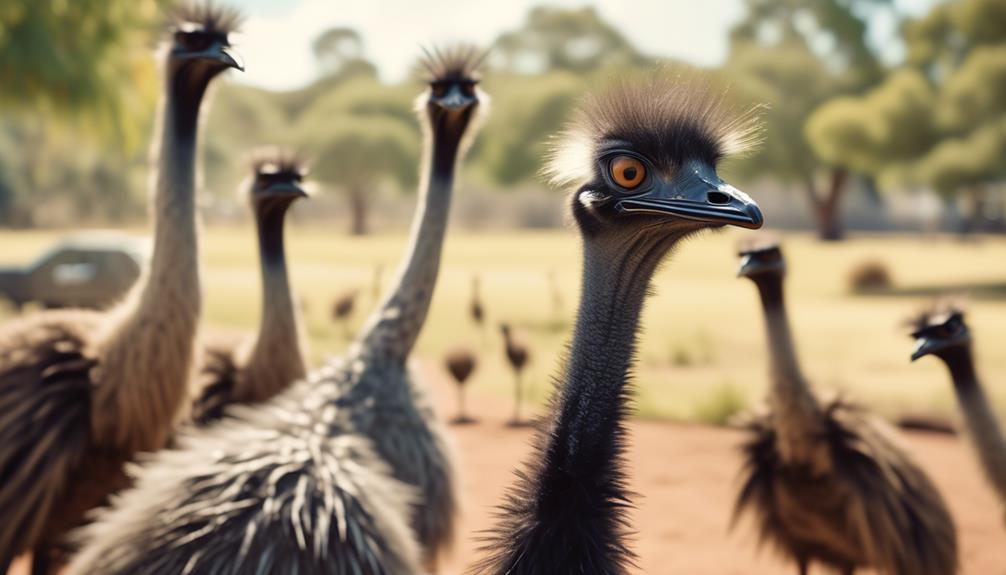
Socialization is a crucial aspect of caring for pet emus, as it helps them develop positive relationships and behaviors towards both humans and other animals.
To successfully socialize your emu bird and build a strong bond, try the following tips and techniques:
- Spend Quality Time Together: Emus are social creatures and need regular interaction with their owners. Allocate dedicated time each day to engage with your emu, whether it's through gentle petting, playing, or talking to them in a calm and soothing voice.
- Positive Reinforcement: Emus respond well to positive reinforcement. Reward good behavior with treats, praise, or a gentle pat on their feathers. This will help them associate positive experiences with your presence, encouraging trust and cooperation.
- Gradual Exposure: Introduce your emu to different environments, people, and animals gradually. Start with familiar faces and calm surroundings, and gradually expose them to new situations. This will help them become more comfortable and reduce anxiety or fear.
Building a bond with emu birds requires patience, consistency, and understanding. Remember to respect their boundaries and allow them to approach you on their terms. With time and effort, you can establish a strong and trusting relationship with your emu bird.
Emu Bird Health Care
To ensure the overall well-being of your pet emu, it's essential to prioritize their health care needs. Proper emu bird veterinary care is crucial in preventing and addressing common health issues that may arise. Regular check-ups with an avian veterinarian are highly recommended to monitor your emu's health and catch any potential problems early on.
When it comes to common health issues in emus, there are a few to be aware of. One such issue is lameness, which can be caused by various factors such as nutritional deficiencies, infections, or injuries. Regular observation of your emu's gait and behavior can help you detect any signs of lameness promptly.
Another common health issue is eye problems, including infections and injuries. Regularly inspecting your emu's eyes for redness, discharge, or swelling can help you identify any issues that may require veterinary attention.
Additionally, emus can experience respiratory issues, such as pneumonia, which can be caused by bacterial or viral infections. It's important to provide a clean and well-ventilated environment for your emu to minimize the risk of respiratory problems. Maintaining good hygiene practices, such as regular cleaning of their living area, can contribute to their overall health.
Emu Bird Legal Considerations

Understanding the legal considerations surrounding the ownership of emu birds is essential for any prospective or current emu owner. Emus, being exotic birds, are subject to certain legal restrictions and regulations. Here are some key points to keep in mind:
- Emu bird legal restrictions can vary by country, state, or even local jurisdiction. It's important to research and understand the specific laws and regulations that apply to your area.
- Some areas may require you to obtain a permit or license before owning an emu bird. These permits often involve certain criteria, such as the size of your property or specific enclosures for the emus.
- Emu bird ownership regulations may include requirements for proper care, housing, and feeding. It's crucial to familiarize yourself with these regulations to ensure the well-being of your emu bird and compliance with the law.
Emu Bird Challenges and Considerations
Once you have navigated the legal considerations surrounding emu bird ownership, it's crucial to understand the various challenges and considerations that come with caring for these unique creatures.
Owning emu birds can present several challenges that require careful attention and preparation. Firstly, emus are large flightless birds that require ample space to roam and exercise. They need a secure and spacious enclosure, preferably with a tall fence to prevent them from jumping or escaping.
Additionally, emus have specific dietary needs, including a balanced diet of grass, grains, and supplements. It's essential to provide them with a varied and nutritious diet to ensure their overall health and well-being.
Another challenge is the social nature of emus. They're highly social birds that thrive in pairs or small groups. Therefore, it's recommended to keep at least two emus together to prevent loneliness and promote their natural behavior. However, it's important to note that emus can become territorial and aggressive, especially during breeding season. Proper handling and socialization are crucial to prevent any aggressive behavior.
When it comes to emu bird care requirements, it's important to understand that these birds have specific needs, such as regular veterinary check-ups, proper grooming, and regular inspections for any signs of illness or injury. Emus can be prone to certain health issues, including parasitic infections and joint problems, so it's important to have a good understanding of their health needs and seek professional advice as needed.
Frequently Asked Questions
Can Emus Be Trained to Perform Tricks or Tasks?
Emus can indeed be trained to perform tricks or tasks. Their intelligence allows for effective training methods, and with time and patience, you can teach them a variety of behaviors and tasks.
Are Emus Noisy Birds?
Emus can be quite noisy birds, emitting low-frequency booming sounds that can be heard from long distances. They use vocalizations to communicate with each other and establish their territory.
Do Emus Require Any Specific Grooming or Maintenance?
Taking care of emus requires specific grooming and maintenance. Regular grooming, including trimming their nails and feathers, is necessary. Additionally, emus need a clean living environment and proper nutrition to ensure their overall health and well-being.
Are Emus Prone to Any Specific Diseases or Health Issues?
Emus, as with any animal, have specific diseases and health issues to be aware of. It's important to understand their breeding patterns and nutritional requirements to ensure their overall well-being and prevent any potential health problems.
How Do Emus Interact With Other Pets or Animals in the Household?
When it comes to interacting with other pets or animals in your household, emus can be unpredictable. They may display aggressive behavior or become territorial. It's important to introduce them slowly and supervise their interactions to ensure everyone's safety.
Conclusion
In conclusion, owning an emu bird as a pet may seem like an exciting prospect, but it's important to consider all the factors involved. These birds require a specialized diet, a suitable habitat, and socialization to thrive.
Additionally, legal considerations and the challenges of caring for their health must be taken into account. Just like taming an emu, life is full of challenges that require careful attention and understanding.
So, before embarking on this unique pet journey, make sure you're ready for the commitment it entails.
